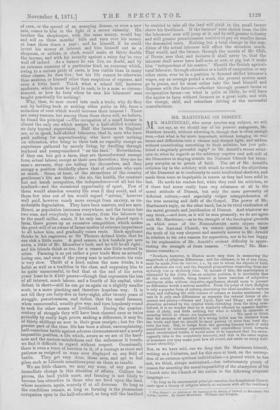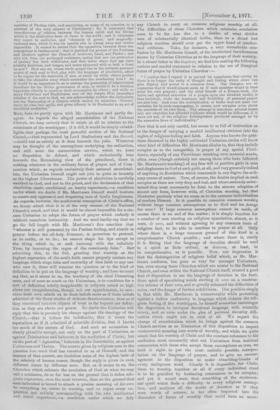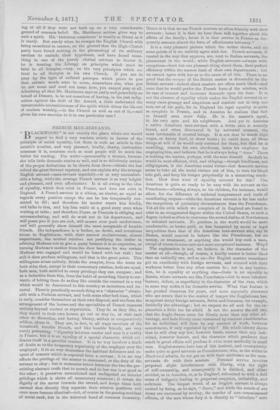MR. MARTINEAU ON DISSENT.
TR. MARTINEAU, who never touches any subject, we will not say, as we should say of his present antagonist, Mr. Matthew Arnold, without adorning it, though that is often enough, true,—but what is far more important, without bringing its real) issues and difficulties into a clearer and sharper light, and seldom without contributing something to their solution, has just pub- lished a singularly powerful reply* to Mr. Arnold's recent strict- ures on what he regards as the arbitrary caprice and self-will of the Dissenters in staying outaide the National Church for trum- pery scruples as to points of faith. The art of Mr. Arnold's criticism lay in the subtlety with which he reduced the objections of the Dissenter as to conformity to mere intellectual shadows, and made them seem as impalpable in reason as they had been solid in fact. He made his readers feel, while they read his criticism, as if there had never really been any substance at all in the moral attitude of Dissent, but only the mere perversity of deficient culture,—and especially vulgar misapprehension of the true meaning and drift of the Gospel. The power of Mr. Martineau's reply, on the other hand, lies in its vivid vindication of the moral grounds and justification of Dissent. And whatever we may think,—aud here, as it will be seen presently, we do not agree with Mr. Martineau,—as to the strength of the theological grounds. on which some of the Nonconformist sects abjure union with the National Church, we cannot question in the least the truth of his very eloquent and masterly answer to Mr. Arnold in relation to his own reasons for separation, nor is he less happy in his explanation of Mr. Arnold's evident difficulty in appre- Mating the strength of these reasons. "Nowhere," Mr. Mar- tineau remarks,—
"Nowhere, however, is illusion more easy than in measuring the magnitude of religious differences ; and the estimate, to be of any value, the interior,
must be madefroin e., by one to whom the objects of faith and affection are real, and the disputed propositions respecting them are definitely true or definitely false. If, instead of this, the appreciation is attempted by the critic from an exterior position, it is inevitable that all the actual beliefs, being treated as mere varieties of subjective sentiment, alike without objective significance, should seem to present no difference worth a serious sacrifice. From his point of view, Religion is only a popular form of culture, exercising the ideal faculties in various ways, and suffusing life with colours of solemn or tender sentiment : he sees in it only such differences as separate the several forms of elo- quence and poetry—Drama and Lyric, Epio and Elegy ; and with his attention arrested by the symbol while shrinking from the thing sym- bolized, it is no wonder that ho is similarly affected by opposite expres- sions of piety, and finds nothing but what is trivial in intervals of meaning whioh to others arc impassable We used to think that the measure of mischief in a wrong belief was Its distance from the truth, and that we should be most patient of error that least dis- torts the real. But, to judge from the growing literary habit of mild compliment to extreme superstition, and supercilious scorn towards more overstrained truths, it would seem to be supposed that the extra- vagantly false is the completely innocent, and that in the outer region of nonsense you may make your bow all round, and smile on every well- meant absurdity."
Nor, as we have said, can we deny that Mr. Martineau himself, writing as a Unitarian, and for this once at least, on the assump- tion of an extreme spiritual individualism—a ground which he has not, we think, always maintained,—has unfortunately plenty of reason for asserting the moral impossibility of the absorption of his Church into the Church of the nation in the following eloquent language :—
" So long as its sacramental principle remains, the Established Church rests upon a theory of religion utterly at variance with all the residuary Why Dissent? an Address on Ore Open fag of Me Session of 187041 of Manchester New Ogler, London, By James Martineau. Williams and liorgate. varieties of Puritan faith, and amounting, as many of us conceive, to a reversal of the very essence of Christianity ; for it intercepts that immediateness of relation between the human spirit and the Divine which is the distinctive boon of Jesus to the world ; and it reinstates that resort to mediation, and 'channels of grace,' and magically- endowed men, which it was his special aim to sweep away and render impossible. It cannot he denied that the opposition between these two conceptions is fundamental ; that it justified the protest of the Puritans and Quakers against the Church of Andrews, Laud, and Parker ; and why not, then, our prolonged resistance, seeing that not one pretension of prelacy has been withdrawn, and that never since that age have priestly doctrines, and usages, and tastes advanced with so bold a front as now ? How can we, whose whole gospel lies in the intimate personal access of each soul to God, play with the language of absolution, affect to be organs for the remission of sins, or stand by while others profess to take the obstacles away which neutralize the everlasting love ? As it would be an imposture in us to assume the possession of supernatural functions for the divine governance of men, so would it be a faithless hypocrisy silently to sanction their assumption by others ; and while so many Christians and Englishmen rest on the simple, filial, immediate relation of the soul to God, we can acknowledge neither the Catholicity nor the Nationality of a Church which makes its ministers 'Priests,' turns its rites into spells, and gives efficacy in its Eucharist to an act of sacrificial mediation."
Now, here we partly agree with Mr. Martineau and partly dis- agree. As regards the alleged sacerdotalism of the National Church, we deny entirely that it exists at all in relation to the conscience of the worshipper ; if it did, it would be simply unintel- ligible that perhaps the most powerful section of the National
Church,—that represented by Lord Shaftesbury and the Record,
—could rest as calmly as it does beneath the yoke. Whatever may be thought of the assumptions underlying the ordivatiou, and still more the consecration service, which we have no disposition to defend, and which undoubtedly lean towards the Romanizing view of the priesthood, there is nothing whatever in the ordinary forms of prayer and of Com- munion which, as regards exclusively their assumed sacerdotal- ism, the Unitarian himself might not join in quite as honestly as the highest Churchman. The power of absolution is carefully ascribed to God, and not to the priest, and the declaration of that
absolution made conditional on hearty repentance,-.—a condition under which we doubt if Mr. Martineau himself would hesitate to assure any oppressed and despairing man of God's forgiveness. As regards, however, the mediatorial conception of Christ's office, we freely admit that it is of the very essence of the National Church's creed, and that it would be almost impossible for a sin- cere Unitarian to adopt the forms of prayer which embody it without conscious insincerity. And we need hardly say that we go the full length with Mr. Martineau's fine assertion that " whoever is still Tossessed. by the Puritan feeling, and stands in prayer before the all-holy Presence, is powerless to pretend, or to recite, or to lie ; he cannot shape his lips except to the thing which is, or seek harmony with the infinitely True, by becoming the organ of the consciously false." But' admitting this, to the full, granting that worship as the highest expression of the soul's faith cannot properly contain any language which rings false and unworthy of that faith to any one who uses it, there still remains the question as to the kind of definition to be put on the language of worship ; and here we must say that, as it seems to us, the tendency of the chief Dissenting sects, and of none so much as the Unitarians, is to condition for a sort of definition totally inapplicable to subjects raised so high above our comprehension, though not our apprehension, to cate- chize their own minds as to their beliefs more as if those beliefs admitted of the finest shades of delicate discrimination, than as if they concerned common objects of trust as far beyond our defini- tion as they are above our power. No doubt the Unitarian will reply that this is precisely his charge against the theology of the Church, —that it defines the indefinable, that it treats the mysterious as if it admitted of scientific divisiou, that it knows too much of the secrets of God. And such an accusation is clearly plausible enough, not only on the part of Unitarians, as against Triuitarians aud believers in the mediation of Christ; but on the part of " Agnostics," believers in the Inscrutable, as against Unitarians and Theists. The answer given by religious men to the question how much God has revealed to us of Himself, and the manner of that answer, are doubtless some of the highest tests of the sobriety of human reason, though the reply is given in such different terms by different men. But as it seems to us, the Churches which estimate the revelation of God at what we may call a minimum, do so far less on the ground that it defies ade- quate expression, even the most reverent, than on the ground that each individual is bound to attach a precise meaning of his own to everything he. utters in worship, and to reject every ex- Presuou not entirely corresponding with his own intellectual and moral experieuce,—a condition under which we defy
any Church to carry on common religious worship at all. The difficulties of those Churches which minimize revelation seem to be far less due to a dislike of what divides men of substantially identical faiths, than to a dread lest religious emotion should ever get the upper hand of intellec- tual criticism. Take, for instance, a very remarkable con- fession by Mr. Martineau himself, of the intellectual fastidiousness
shown by Unitarian Churches as to the language of their worship. In a recent letter to the Inquirer, we find him making the following curious and candid statement in relation to the use of liturgical forms of prayer by Unitarian Churches :— " I confess that I regard it as proved by experience that among us there is no longer the unity of thought and feeling which alone can give dignity and power to a common form. Our liturgies are so numerous that it would almost seem as if each minister would in time print his own prayers ; and the chief benefit of a Prayer-book, the union and spiritual education of a people upon one elevated model, is thus forfeited; while the freshness and flexibility of personal prayer are also lost. And evon the multiplication of books does not meet our varieties, for in each congregation, it seems, new scruples arise about the contents of its own form. The attempt to introduce printed forma Into our churches has afforded evidence which would be ludicrous, if it were not sad, of the religious disintegration produced amongst us by the excessive force of individuality."
Now that is not only candid, but seems to us full of instruction as to the danger of carrying a morbid intellectual criticism into the region of religious feeling and faith. Anyone who knows the ques- tions discussed in the highly cultivated Unitarian circles will know what kind of difficulties Mr. Martineau alludes to, that they include scruples as to the recognition in prayer of any special Provi- dence, especially of any Providence watching over material wants, often even (though certainly not among those who have followed Mr. Martineau's teaching) of any free-will or positive guilt in man and displeasure in God at such guilt, at all, and very generally indeed of anything in Revelation which transcends in any degree the ordi- nary course of nature. Now, of course, the doubts implied in such scruples as these are very deep and real, and whore seriously enter- tained they most necessarily be fatal to the sincere adoption of
almost any form, however wide, of Christian worship, but that illustrates precisely what we mean as to the extreme individualism of modern Dissent. Is it possible to conceive common worship without large common assumptions as to God and his doings for man? If large common assumptions cannot be made, of course there is an end of the matter ; it is simply hopeless for a number of men starting on religious speculation, almost, as it were, de HOW, and without agreeing to any common basis of religious fact, to be able to combine in prayer at all. Only where there is a large common ground of this kind is a comprehensive Church possible ; and where there is, surely it is fitting that the language of devotion should be used in a spirit as little critical, as desirous, at lead, to be comprehensive, as is possible. Now, our impression is that the disintegration of religious belief which, as Mr. Mar- tineau confesses, has gone so very far amongst Unitarians, has, even among those Churches which are nearer to the National Church, and even within the National Church itself, created a good deal of disposition to use the language of devotion in the fasti- dious spirit of speculating minds starting de novo on a construc- tive scheme of their own, and so greatly enhanced the diffieulties of
union, and the danger of further subdivision. Our position simply is, that while Mr. Martineau is unanswerable while protesting against a hollow conformity to language which violates the reli- gious feeling of the worshipper, he himself somewhat encourages the disposition to interpret devotional language with scientific nicety, and so raise under the plea of personal sincerity diffi- culties which ought not to exist at all. We regard the charge of sacerdotalism which he brings against the common Church services as an illustration of this disposition to import controversial meaning into words of worship, and while we quite admit that the worship of Christ and the constant reference to his mediation must necessarily shut out Unitarians from habitual communion with those who accept these assumptious as true, we hold it right to put the most catholic possible interpre- tation on the language of prayer, and to give no encour- agement to the disposition to make stumbling-blocks of every ambiguous word. Clearly it is impossible for Chris- tians to worship together at all if every individual creed is to be gratified by hesitating concessions to its scruples ; and yet it would seem that something of the controver-
sial spirit which finds a difficulty in every religious assump- tion, and analyzes all the words of devotion as of they were words of science, is too often imported into the
discussion of forms of worship that could have no mean-
bag at all if they were not built up on a very considerable ground of common belief. Mr. Martineau seldom gives way to such a spirit. His historical conscience' is usually as liberal as it is manly. But surely when he charges the English Church with being sacerdotal in essence, on the ground that the High-Church party have found nothing in the phraseology of its ordinary services to exclude their hypothesis, and have found some- thing in one of the purely clerical services to favour it, he is treating the Liturgy on principles which must be fatal to all liturgies,—nay, on the very principles which are fatal to all liturgies in his own Church. if you are to pray by the light of collated passages which prove to you that certain words seem to mean, somewhere else, what you do not mean and need not mean here, you cannot pray at all. Admitting all that Mr. Martineau says BO justly and powerfully on behalf of Dissent, is he not conscious of having, in his just indig- nation against the drift of Mr. Arnold, a little underrated the unreasonable contentiousness of the spirit which drives the life out of modern worship,—in the Church as well as out of it,—and given his own sanction to it in one particular case ?




































 Previous page
Previous page